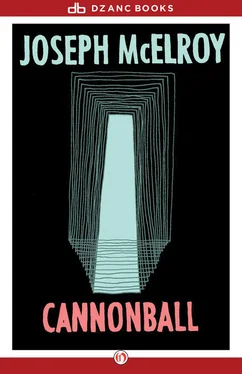Joseph McElroy - Cannonball
Здесь есть возможность читать онлайн «Joseph McElroy - Cannonball» весь текст электронной книги совершенно бесплатно (целиком полную версию без сокращений). В некоторых случаях можно слушать аудио, скачать через торрент в формате fb2 и присутствует краткое содержание. Год выпуска: 2013, Издательство: Dzanc Books, Жанр: Современная проза, на английском языке. Описание произведения, (предисловие) а так же отзывы посетителей доступны на портале библиотеки ЛибКат.
- Название:Cannonball
- Автор:
- Издательство:Dzanc Books
- Жанр:
- Год:2013
- ISBN:нет данных
- Рейтинг книги:5 / 5. Голосов: 1
-
Избранное:Добавить в избранное
- Отзывы:
-
Ваша оценка:
- 100
- 1
- 2
- 3
- 4
- 5
Cannonball: краткое содержание, описание и аннотация
Предлагаем к чтению аннотацию, описание, краткое содержание или предисловие (зависит от того, что написал сам автор книги «Cannonball»). Если вы не нашли необходимую информацию о книге — напишите в комментариях, мы постараемся отыскать её.
continues in McElroy's tradition of intricately woven story lines and extreme care regarding the placement of each and every word. A novel where the sentences matter as much as the overall story.
Cannonball — читать онлайн бесплатно полную книгу (весь текст) целиком
Ниже представлен текст книги, разбитый по страницам. Система сохранения места последней прочитанной страницы, позволяет с удобством читать онлайн бесплатно книгу «Cannonball», без необходимости каждый раз заново искать на чём Вы остановились. Поставьте закладку, и сможете в любой момент перейти на страницу, на которой закончили чтение.
Интервал:
Закладка:
“What are you doing here ?” I said. She had a job, and looked like it. And she’d never been invited in the days of my friendship with Milt, and had had a previous engagement, Dad’s birthday, the night of The Inventor’s party (though held at Cheeky’s) celebrating my enlistment from all appearances. Why would she come here? She was uninclined to, she wasn’t much of a collector and would have had no reason to visit The Inventor while I was gone and none now — she was so intelligent, it occurred to me. This so obvious a reason it was disturbing. She’d had to come here.
“The girl has her own reasons for visiting,” Cheeky said. “Have I told you how that big boy took me in his arms when we met at the dock and thanked me for coming and gave me a book, but not a book book,…this—” she took out of the display case a catalogue big as a phone book, and slid the glass front out and down again, she was moved. “His own person,” she said. She wasn’t about to hold forth. She seemed to embrace what was coming. An old person listening. What for?
“Your place”—E-m nodded quickly (so unlike her). For the story E-m told now wasn’t as she and I ever ever would speak to each other, like a clock telling time, boring almost, chitchat, going through the motions, and something was up to me: what was it like, a controlling person, which my sister did not know how to be, yet we were used to being surrounded by them.
“Mom phoned my cell, she thought I was at work. There’s a break-in at your place. Stud called her. He dropped you off at the bus, she thought it would be the 41, but I figured out why — you were coming here and caught a ride with Stud in the middle of traffic (?) — He said, How’s it going? Ask me tonight, you said, tomorrow, next month if I’m here, Mom said, you were in a rush. And Bea phoned.”
And, and, but when did she phone ? I said mouthing the words — this was all jumbled, not even at our typical slant — it was up to me to calculate, and Cheeky, understanding that it was between the two of us which is not what you do when you invite yourself into someone else’s place, said “Break-ins” so softly that she seemed to want to speak only to us and it had its effect—“and phone calls. Only way to stop what’s going on is not to live anywhere. I’m going to have a pyre in the back yard here when I die; and I’m easy I don’t care if it’s quite soon.” My sister said she would like to see that. “What took you to my place?” I said, strangely for I was OK with it, more than OK. “Bea briefed you on the Hearings?” I seemed to change the subject. My sister looked at me, she put everything into it. “She sort of went on about it, how you handled those people. ‘Nice work,’ she said.” “Storm Nosworthy’s words,” I said changing the subject for she was jealous. “Him again?” said my sister — my father’s daughter, I understood—“didn’t we have enough of him? What did he mean?” “Us. The old Sinatra song. You , really. ‘Nice work if you can get it’s all I remember. He’s got a…” “He came clear across the country for this?” “No. But we’ll find out this afternoon.”
“Well, there’s a job I won’t get.” “If what?” I said. Cheeky held the catalogue up. We heard The Inventor at work in the other room. The envelope room among other things. Was my hearing newly acute over my disappointment the last months with photography if not sight itself?
“I don’t know what.” She must keep on behind me, my amazing girl for this historical moment if I could put it together (but what job?). “If he’s not afraid of you, what you know,” I said, and I saw the warped, mobile face she would read when she met Storm (very soon I saw), as, just last night, I heard her draped in a towel read to me, “My Tools took Human — Faces—/ The Bench, where we had toiled—/ Against the Man — persuaded—”
— where “Against” also means anticipating , and “Bench” itself did the persuading, it came to us;
and hearing The Inventor muttering like a priest I saw Storm’s eye gravitate to hairs on a toilet seat, stained underwear on a threshold, damp, dark towel reaching across a tossed family comforter my mother had given me; yet I seem to have foreseen that it wasn’t our intimacy Storm cared to use against us but my knowledge he must keep inactive though not me.
“You went to my place?” At the office was where she was when her friend Bea phoned. “Collect some a my things,” she almost couldn’t say it.
“Were they there?” Gather together things. Books, closet, laundry, bathroom, notebook on the kitchen windowsill, necklace on the bedroom rug, God knows what else incriminating on the dark green comforter she had given me—“a green bed,” she called it, though she’d left me her incense holder, gift of a neighbor child made in ceramics class. “Oh we have that!” my sister took the American Coaches Directory from Cheeky. Ours I had seen last in her room at home, on the floor, and long before that heard what I’d heard, and left it at that.
“She said—”
“Beatrice?”
“Yes, quite a story you told.”
“Part of it.”
“She told me. From that photographer, our Chaplain, my God, it made me realize—” “Passing it on.” “So they need to silence him?” “I said too much.” “But he’s dead.” “Between you and me.” My sister alone for a moment, was this why she’d come? or to use all this? For what? to set out at last? to leave? I knew what she was thinking.
“And he took me in his arms,” said Cheeky, “and hugged me and gave me this very book he’d brought all the way with him thousands of miles and risked his life taking and I was to take charge of it, from Mexico he wanted to travel light, and here it is.” (“And ‘the Other’? all that?” murmured my sister, for I took her hand: “If I only knew who it was.”)
The Inventor was back among us. He said: “I will show you what I have written down and I will read it out loud, it is yours, but, but…”—he was deeply surprised, almost quieted—“I have made…” He had penned the words on an oblong brown paper panel torn from a Ralphs grocery bag in letters still smaller than those of the Scroll scrap. It was late. What did I owe my sister, him, anyone? “…I have made a discovery!” he said. “But here is your own private and perrssonal scroull, you and yours,” The Inventor said, who seemed moved or leaving something out in advance, his voice urgent, disturbed, honored. “Listen,” he said:
“‘—always inspiring’ [it begins,” he said, “(where someone tore the paper) — he means, ‘Be’—‘Be inspirin g’ ] ‘but make yourself like firewood or water scarce, commodity-wise’ [that’s what it says] ‘though present’ [‘on call’(?)]. ‘And when you are mobbed, and the Jerusalem scribes try to get hold of you but first your family try to detain you out there in the street because they think you are crazy’—[‘beside yourself’ is closerr]—‘to your hearers you will say, “Who are my real mother and brothers?” and answer, “Those who do the will of God, and have the Godspeed gift,” but in another place next day, “A house divided within itself is a bed of ferment where enterprise can thrive,” and without warning you appear somewhere else near a barren fig tree for which you prescribe a particular transplant, or another day ask, “Why baptism if you do not understand water?” Or elsewhere if you imagine a water that quenches thirst once and for all for a woman just like a sister who you know has taken several lovers and she thinks you are a prophet to know such a thing about her, you as a storyteller in your own story this time keep your identity secret from this mere Samaritan woman whom you compete with on equal terms until the moment when you can’t hold it back any longer and it will be a stunner until…when they write about you, you will seem to have said all these things in one day, and you can foresee a tool invented many years hence, to put pictures side by side better than talk.’
Читать дальшеИнтервал:
Закладка:
Похожие книги на «Cannonball»
Представляем Вашему вниманию похожие книги на «Cannonball» списком для выбора. Мы отобрали схожую по названию и смыслу литературу в надежде предоставить читателям больше вариантов отыскать новые, интересные, ещё непрочитанные произведения.
Обсуждение, отзывы о книге «Cannonball» и просто собственные мнения читателей. Оставьте ваши комментарии, напишите, что Вы думаете о произведении, его смысле или главных героях. Укажите что конкретно понравилось, а что нет, и почему Вы так считаете.












